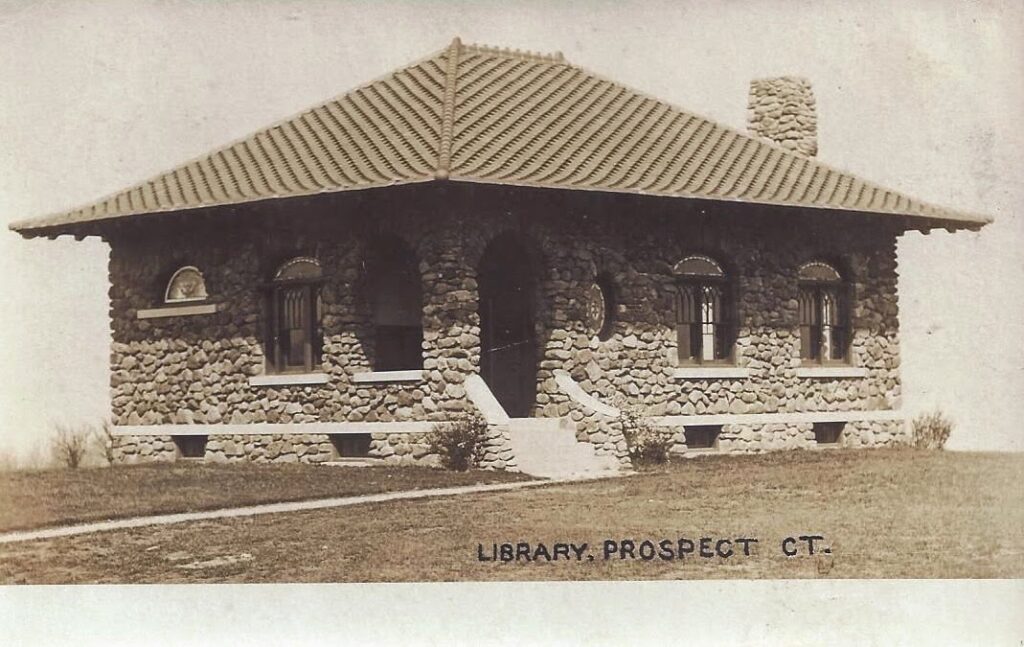
A while back my youngest brother sent me a thumb drive of digitized slides that my father took over the years. There are some great memories in there. With the 4th of July celebration coming up this week, I thought I’d share a few slides of a patriotic celebration in my hometown of Prospect, Connecticut. I believe this was in the last years of the Eisenhower administration. It was in first or second grade. I vividly remember making those shakos out of construction paper and those big jars of white paste. We practiced our songs in class and practiced marching in the playground. We marched to the Town Green and sang our songs as we paraded around the soldier’s memorial.
I’m sure this was not a 4th of July celebration. The occasion could have been either Flag Day or Memorial Day. I do remember that a lot of parents were in attendance including my mother and father. We lived in the former glebe house on the Green opposite the Congregational Church. My father would take time off from work for these things. We were all unabashedly patriotic in those days.
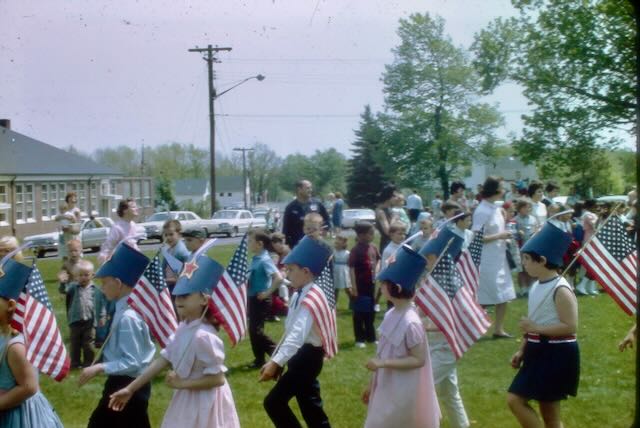
It wasn’t a long march. The Prospect Community School, on the left, abutted the green. That’s me at center front marching as my father taught us. I was holding my flag as I would hold a rifle with my thumb and forefinger forming an O. My brother and sister also knew that was the right way as my father taught us the manual of arms with our toy rifles. I’m pretty sure I had a Mattel Winchester from “The Rifleman” at the time, along with my cap pistols and leather holster.
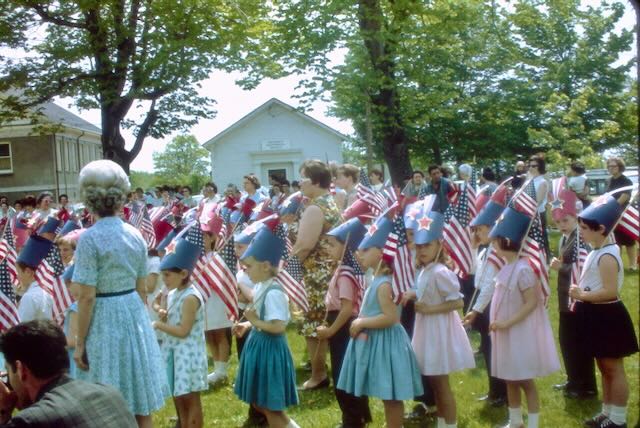
I believe that is Mrs. Bennet in the foreground leading her class into place. in the background stands the Grange Hall, an imposing and important grey stucco building and the Prospect Historical Society building in a former one room schoolhouse. The historical society has since moved to the Hotchkiss family homestead.
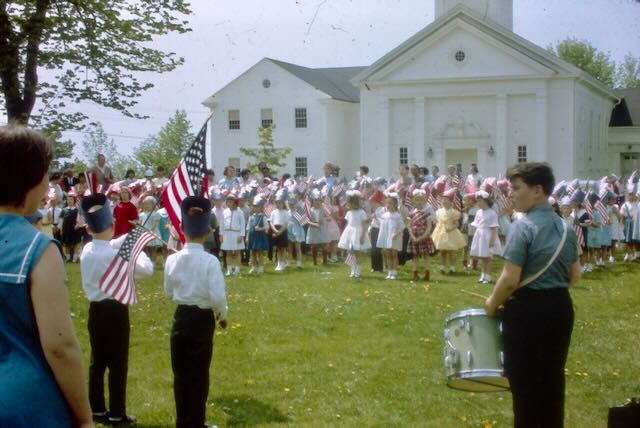
Here’s the Congregational Church. Although this is the third church, the first two burnt down, It stands on the same spot that one of our town founding fathers, Gideon Hotchkiss, built the first Columbia Parish Church in what was to become Prospect. Gideon was a Puritan who fought at Ticonderoga and Fort William Henry with two of his sons during the French and Indian War. He later was a leader in a local Committee of Safety, organizing troops for militias and the Continental Army. He himself fought at the Battle of New Haven during our War of Independence.
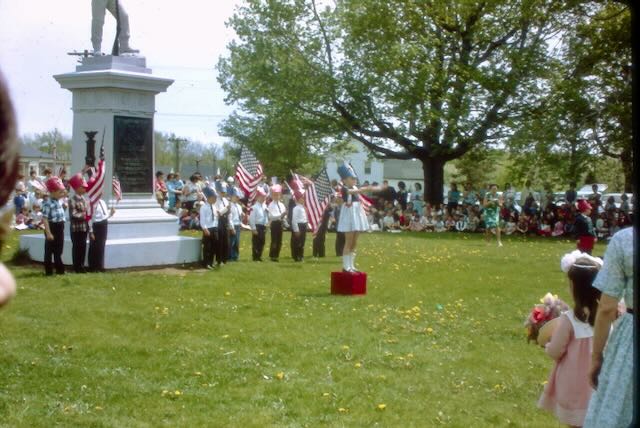
We formed in front of the town’s Soldier’s Monument dedicated in 1907. The Petrauskas farmhouse can be seen in the background. That’s where I learned to pitch hay and milk cows. A number of parents and other town folk watched us from the shade of the maple trees.
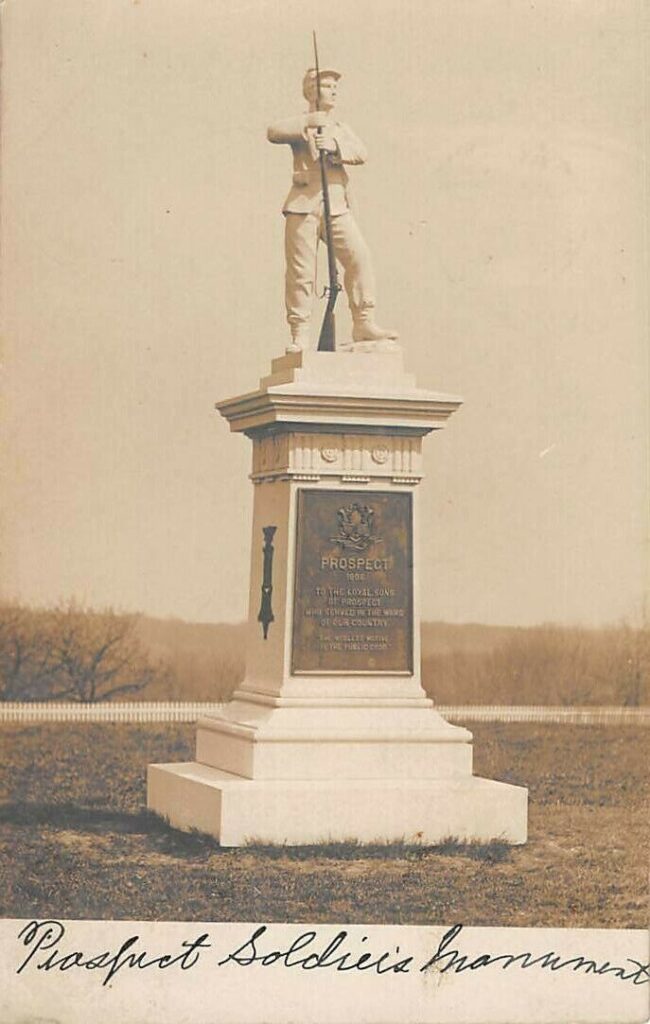
Those were good days in Prospect. It was an unbelievably good time and place to grow up. Our history, from local to national, was taught regularly. The requirements of citizenship were regularly explained to us by our teachers and, especially, by the example of those teachers and other town leaders. Our biggest worry, which we somehow endured in stride, was the regular air raid drills. As the sirens blew, our teachers led us into the interior hallway of the Community School where we crouched against the granite bedrock for protection against a potential atomic blast from the Rooskies. Other than that, life was grand.
TTG
Prospect Historical Society Bicentennial Pamphlet
https://chs.org/finding_aides/ransom/103.htm
https://historicbuildingsct.com/prospect-public-library-meeting-place-1905/

I learned later in life, to avoid Shakos where possible. (Under circumstances COL[R] Lang would understand.)
That was so evocative, TTG, SWMBO read it fascinated and for me it brought back memories. Though I’ve never pitched hay. Almost invariably it was baled and only a few old-fashioned farms carried on the old way. I was sent over to help out once at one of those old-fashioned farms and they must have done that bit of it when I was back at school. But I was put to the turning, so that’s pretty well the same thing. Two men, or in this case a seasoned farm worker and a boy. Me. One to each side of the row.
The farm worker was very seasoned. He had a big old glazed pottery bottle with something stronger than tea in it. At the end of the row he’d take a swig and throw the bottle on the next row. Or rather, the next row but one. No fool, he was thinking ahead to the time we came back that way again.
The field we were working in was very big. It was also triangular. We started on the longest row and as the work went on the rows became shorter and shorter. By the time we got to the really short rows I was on my own because he was too drunk to do more than stand there beaming contentedly. Very well planned, the whole operation, I thought. It’s good working with men who have the wit to think ahead.
All that came back to me later in Ireland, at a time the Troubles were just drawing to a close. We’d seen a field that, amazingly, had little hayricks in it. Dotted around all over the field. Amazingly because everyone had long since moved to big bales so this was living history in front of us. We stopped there for a picnic. As we started eating a helicopter came over, And kept on coming over. We ate to the sound of a circling helicopter and it circled until we left.
As we drove away I could see why. On the other side of the hill was a big army base. Wire all round. A long long tunnel, sides in galvanised iron so you could walk down the tunnel undetected, reaching out for hundreds of yards on ever longer stilts as the hillside fell away, and terminating in an observation post perched miles up in the air.
I suppose the helicopter had been flying over us in case there was any mischief afoot. Everything was a little tense even as the Troubles were nearly over. You’d take the dog for a walk in the early morning and out of the mist would emerge a line of men with guns aslant hastening silently by, intent on their own affairs. The boarded up police stations, wreathed in barbed wire and looking very scruffy – because of course you can’t paint walls through barbed wire and it had been there for a while by then. Or the one way spikes in the road at the checkpoints. In the middle of all that a field farmed as it had been farmed for ever.
EO,
The Petrauskas farm never had more than a dozen milk cows so they never had the need for a baler. We pitched the hay onto the well worn wooden flat bed of a Model AA Ford truck. One of the Petrauskas boys (grown men actually) would drive the truck into the barn and we’d pitch the hay into the loft. They’d also harvest the wood for the gravity fed wood furnace on that Model AA. They’d use chainsaws and a small sawmill for that.
TTG – you remember the milking machines?
Electricity came late to my valley. Some of the farms were connected up only a year or so back. One or two still don’t have it. No big deal. The old diesel generators were reliable and cost little to run. Everyone’s had internet for a long time now but mains electricity is still for a few an optional extra and they don’t bother to lay out the money for it.
Way back many of the farmhouses weren’t wired up either so it was the Aladdin or Tilley lamps as a rule when you dropped round of an evening. I still keep those for when we get outages. So on an evening stroll in the old days you’d see the soft glimmer of the lights and hear, almost every farm, the put-putting of the generator and the hissing and clicking of the milking machines.
Might be a herd of a hundred or so. Might just be the odd dozen. Hard work, early and late every day, but a reliable income. No tankers. Churns, cooled and then rolled out onto the roadside stands for the milk lorry to collect. Not if there was heavy snow but it usually managed to get through. Kicked up a hell of a din, that milk lorry, when it was bringing the empties back. You could hear it from miles away and rolled the last few churns onto the stand hastily.
None of that remains. The last dairy farm packed it in a while back and most of the grass is let. The farm houses usually taken by incomers. No shotguns on the rack above the fireplace or leaned up in the corner – that’d be illegal now anyway – and seldom the fireplace still there. The barns converted and no livestock close by in the outbuildings.
It was a while after University, quite a while, before I managed to get back to that valley. Most never did. There’s no longer a living there for the sons to take over. But I’d drop back from time to time and perhaps saw the changes more vividly than those who lived them from day to day and maybe didn’t notice them quite so much. As a jerky sequence of stills can show more than a continuous video. So I saw it all go, bit by bit.
On the evening stroll when I got back for good it was like walking a foreign country. The milking machines are silent now. Long since been scrapped. The men who used them gone and none to take their place. The old farm labourers’ cottages more, as you term it, a bedroom community for those who work elsewhere. Never go back, they say, and they could be right. You see too clearly what has been lost.
Get with the programme, say the urban progressives. Forget that idyllic English past that never truly existed. How can you fail to see it’s better now?
Bullshit. It’s the progressives living in their fantasy land that need their heads testing. One can remember well enough in that far-off past plenty that was far from idyllic and needed urgent remedy. And nothing is ever static nor should it be. It’s not the past one regrets. It’s what we’ve made of it compared with what we could have made of it.
And that what we’re making of the present, if one can look outside their blinkered fantasy land, will be worse yet. Our children will not live as contented as our fathers did, nor even as easy as we did, and that, demonstrably, will be down to our mistakes today.
Not sure how that transition from milking machines to politics occurred, TTG. I suppose because comparing what we had with what we’re going to have does put politics squarely in the frame.
EO,
The first milking machine I saw was on a farm in the northwest corner of Connecticut. A good friend of mine in grammar school immigrated here from the Azores. The family raised free range chickens on a cleared and fenced plot behind their house. In high school, they finally attained their dream of a dairy farm up in the hills above the Housatonic River. The next time I saw a milking machine was in Germany during our UW exercises there.
We didn’t start getting electric power in Prospect until the mid-30s. I was surprised to learn this since we are surrounded by major industrial cities. Electricity was ubiquitous when I was growing up, but we all relied on well water and septic tanks. That’s still the case in Prospect, very odd since we have four reservoirs in Prospect for surrounding towns and cities.
That Was a Very Enjoyable Story You Wrote Major Genius…I Very Much Liked The Photographs You Posted Also….Thats the United States of My Childhood…Children in Costumes Remember…All of it…Triggering Good Memorys…Childhood and Teenage
Life in Almost Any American Community..When Drug Abuse..Communism..And
Un American Activitys Were Despised in America..
I Also Very Much Enjoyed The By The Englishman…The Farms..The Hay Rolls..The Hay Bailers…Thiousands of Acres of Corn..and Peas..As My Cousin Gerald And I Often Drove to The “Valley”……in his 1956 Corvette…For the Annual Family Reunion At the Grange Hall…Pot Luck.. Aunts;;;
Uncles Cousins…Lots of Laughter…That Valley…My Great Grand Fathers Wagon Train Arrived At..in 1859…All Farmers…Big Barns…Hay To Sleep in..The Near by River for a Swim..The Elk Herds…The Valley…
I Wonder If The Chinese are Buying up All of England and Irelands Farm Land….or
If The Church Bells Still Ring Over There..I Know They Do in Germany..Every Sunday Morning..or When a Villager Has ied…
The Church Bells Have Long Been Silenced in the DOD Town I Live in…The Druggers and Wokes Complain The Bella Re Too Loud To Early…The National Anthum and Taps were Turned down so Low..I Can No Longer Hear Them…I Live Right outside the Main Gate.. The Druggers Living in Drug Houses And Wokes …Mostly Just One Person…Complained to the City Or The Base…And The Bells..the Anthem..
All Silenced..
But Its a Democrat Town..Democrat State…And I Am THe Son of a Pioneer..
American Outsider…Who Can Take Comfort in Knowing..I Can Still..Go to the
“Valley”…
Happy Fourth To All..My Thanks to Those Who Made It Possible..Bless the
Children….For Such as These…The Scriptures say..Will Be at the “Reunion”..
and See Uncle Sam..Uncle Patrick…Uncle Henry……and Mary..Mildred..and
Mother…again… Can you Hears The Bells….shhhh Listen..They Ring..Yes
They Do..
Thanks for the lovely pictures of Prospect CT in the 1950s.
When was the last time you were in Prospect?
Has it changed since the 1950s?
If so, how and why?
Just interested in how towns like that are changing, or have changed.
(I think you discussed this in the past, but it would be good to mention it here, or give a link to your past discussion.)
I grew up in Wilkinsburg, PA in the 1950s.
https://en.wikipedia.org/wiki/Wilkinsburg%2C_Pennsylvania
Back then it was “The City of Churches.”
Now it is the City of crime, or drug deals.
Ugh!
Not all change is for the better.
Keith Harbaugh,
I haven’t been back to Prospect since 1988, but one of my brothers and my sister lived there until last year. My father left in the early 90s after my mother died. He left for Maine to escape Connecticut’s high taxes.
Prospect has grown, but still retains its rural/suburban character. It hasn’t changed much since 1971 when I left for college. There still isn’t a high school. There are no big box stores. The only national chains are a Subway shop and UPS Store. The Grange is gone, as is the Petrauskas farm. That land is now the public library. The old fieldstone library is now a public meeting house. I’m glad that was saved. It’s a beautiful building pictured at the top of this posting.
We built a town hall in the mid-60s. Before that, the first selectman also ran the local hardware store. Town meetings were in the Grange or the Congregational Church. Oh yes, we now have a mayor rather than a first selectman.
There are still farms, but the town is mostly a bedroom community for surrounding cities. That change began in the late 50s. My father worked at Pratt & Whitney Aircraft in North Haven. Waterbury was once called the Brass City, but all that’s gone.
Just got back from my brother-in-law’s funeral. He and my Sis lived in what used to be a little country town where the borders of Conn, RI, and Mass meet. But now it has grown into a bedroom community for people working in Providence, Worcester, Springfield and even as far as Hartford. Sad, but then you can’t blame folks for wanting out of the cities.